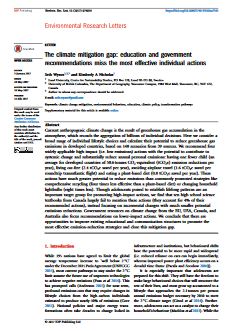 In 2017, Seth Wynes from the University of British Columbia and Kimberly Nicholas from Lund University published an interesting article called “The climate mitigation gap: education and government recommendations miss the most effective individual actions.”
In 2017, Seth Wynes from the University of British Columbia and Kimberly Nicholas from Lund University published an interesting article called “The climate mitigation gap: education and government recommendations miss the most effective individual actions.”
It states that family size is a significant driver of long-term resource demand and carbon emissions.
Overall, population is a big long-term driver and in many situations the biggest – the results of impact vary depending on time horizon chosen. According to Global Footprint Network analyses, per capita consumption has not changed that much in most regions from 1961 to today, but population has. In fact, in lowest-income countries the per-person Footprint, which is already low, has been declining slightly, while population has been more than tripling.
The good news is that the benefits of investing in women, education for girls, and good access to family planning have immediate social benefits so one does not have to wait for the long-term ecological benefits to make those investments worthwhile. On the contrary, those investments are fundamental to humanity’s long-term peace and prosperity.
A poster version is available here.
World press coverage of these findings:
amp.theguardian.com/environment/2017/jul/12/want-to-fight-climate-change-have-fewer-children
motherboard.vice.com/en_us/article/3kn5z9/stop-telling-people-not-to-have-kids-to-save-the-planet
grist.org/briefly/groundbreaking-study-outlines-what-you-can-do-about-climate-change
